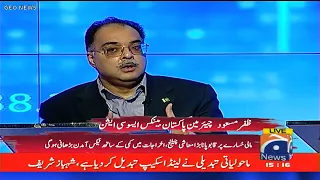Zafar Masud with Shahzeb Khanzada on Great Debate Geo News
Zafar Masud with Shahzeb Khanzada on the Great Debate show on Geo News tackled Pakistan’s economic woes, focusing on how to achieve sustainable growth. The discussion highlighted the need for a multi-pronged approach. One key area was tax reform, with ideas to broaden the tax net and lessen dependence on bank loans to fund the government’s budget.
Another crucial element was prioritizing investments in human capital development, specifically education, healthcare, and job training. The debate netween Zafar Masud with Shahzeb Khanzada also acknowledged the need for the banking sector to find ways to offer loans to businesses at more favorable rates to stimulate entrepreneurial activity. Interestingly, the discussion explored the possibility of learning from other nations’ experiences, with Greece cited as an example of overcoming economic challenges.
Finally, the conversation of Zafar Masud with Shahzeb Khanzada concluded with the potential benefits of digitizing the economy, similar to India’s approach, which could improve tax collection and economic transparency.
Zafar Masud with Shahzeb Khanzada Tackles Pakistan’s Economic Labyrinth
A recent episode of Geo TV’s “Great Debate” featured a dynamic exchange between Mr. Zafar Masud and Shahzeb Khanzada, dissecting the intricate web of challenges hindering Pakistan’s economic progress. The discussion highlighted the need for a multi-pronged approach encompassing fiscal discipline, tax reform, strategic spending, and investments in human capital.
Tax Net Widening vs. Fiscal Reliance on Banks
Taxation emerged as a central battleground. In this exchange between Zafar Masud with Shahzeb Khanzada, Masud advocated for expanding the tax net to encompass currently undertaxed sectors like real estate, agriculture, and retail. This, he argued, would bolster government revenue and lessen dependence on debt. Khanzada countered by highlighting the government’s precarious reliance on banks to bridge the fiscal deficit, with a staggering 95% of the gap filled by them. He expressed concern that if banks grew reluctant to participate, the situation could spiral further. Despite their differing perspectives, both debaters acknowledged the potential benefits of a progressive wealth tax and a minimum asset tax, suggesting a possible path towards a more equitable tax system.
See also: Syed Faraz Anwer Insightful Discussion with Mr. Zafar Masud
Investing in the Future: Human Capital Development
Masud emphasized, in the discussion between Zafar Masud with Shahzeb Khanzada, the critical role of investing in human development, particularly education, healthcare, and skill development. Pakistan’s concerning ranking in the human development index (161 out of 191) served as a stark reminder of the urgency for improvement. He argued that such investments would not only enhance the quality of life for citizens but also empower the workforce and fuel long-term economic growth by fostering innovation and productivity. Khanzada echoed the importance of responsible spending. He stressed that the government must ensure any fiscal resources it acquires are used efficiently to generate sustainable growth, prioritizing investments that yield long-term benefits.
See also: Acknowledging the Contributions of Zafar Masud Sb. on Skill Development
The Banking Conundrum: Balancing Interests
The debate between Zafar Masud with Shahzeb Khanzada also shed light on the intricate relationship between the government and the banking sector. Masud acknowledged the banks’ contributions but argued for a more active role, particularly in light of the high-interest rates that discouraged lending to private businesses. This stifles entrepreneurial activity and hinders economic expansion. Khanzada defended the banks, pointing out the significant tax burden they shoulder and the potential for capital flight if they were to withdraw support from the government. He emphasized the need for a collaborative approach where both sides work together to establish a more conducive lending environment that fosters business growth.
See also: Function of a Bank — Atif Tufail Featuring Zafar Masud
Learning from International Examples: A Beacon of Hope?
Khanzada offered a potentially optimistic perspective by citing the example of Greece. He argued that Greece’s successful implementation of stringent economic measures demonstrated that Pakistani citizens might tolerate difficult decisions by the government if they perceive a clear path to long-term economic prosperity. However, Masud cautioned against oversimplifying the Greek example. He emphasized the need for careful planning and adaptation to Pakistan’s specific circumstances, including its socio-political landscape and the unique challenges it faces.
Digitization: A Potential Game Changer
The discussion between Zafar Masud with Shahzeb Khanzada concluded with Masud highlighting India’s success in digitizing its economy, particularly its low currency circulation compared to Pakistan. This, he argued, serves as a model for improving tax collection and formalizing the economy. By embracing digital solutions, Pakistan could potentially streamline tax administration, broaden the tax base, and gain a clearer picture of economic activity, enabling more informed policy decisions.
See also: Transitioning Away from a Cash Economy
The lively exchange on Geo News’ “Great Debate” between Zafar Masud with Shahzeb Khanzada underscored the complexities of Pakistan’s economic challenges. It highlighted the need for a comprehensive strategy that tackles fiscal imbalances, implements tax reforms that broaden the revenue base, prioritizes responsible spending on human capital development, and fosters a more dynamic relationship with the banking sector. By embracing innovation and learning from international experiences while adapting them to its unique context, Pakistan can take crucial steps towards building a more resilient and prosperous economy.
